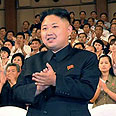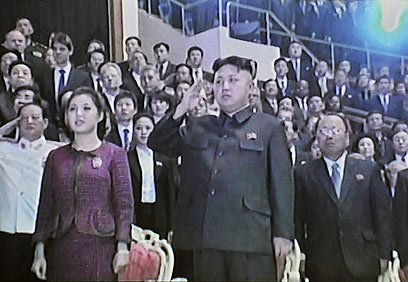
N.Korea warns of nuke test, more rocket launches
Year after father's death, North Korean leader Kim Jong Un indicates no policy change expected; plans nuclear tests despite UN sanctions
North Korea's top governing body warned Thursday that the regime will conduct its third nuclear test in defiance of UN punishment, and made clear that its long-range rockets are designed to carry not only satellites but also warheads aimed at striking the United States.
The National Defense Commission, headed by the country's young leader, Kim Jong Un, rejected Tuesday's UN Security Council resolution condemning North Korea's long-range rocket launch in December as a banned missile activity and expanding sanctions against the regime.
Related stories:
- N. Korea launches long-range rocket
- Security Council condemns N. Korea launch
- N. Korea says South, US within its missile range
The commission reaffirmed in its declaration that the launch was a peaceful bid to send a satellite into space, but also said the country's rocket launches have a military purpose: to strike and attack the United States.
The commission pledged to keep launching satellites and rockets and to conduct a nuclear test as part of a "new phase" of combat with the United States, which it blames for leading the UN bid to punish Pyongyang. It said a nuclear test was part of "upcoming" action but did not say exactly when or where it would take place.

Kim Jong Un and wife Ri Sol Ju (Photo: AFP, North Korean TV)
"We do not hide that a variety of satellites and long-range rockets which will be launched by the DPRK one after another and a nuclear test of higher level which will be carried out by it in the upcoming all-out action, a new phase of the anti-US struggle that has lasted century after century, will target against the US, the sworn enemy of the Korean people," the commission said, referring to North Korea by its official name, the Democratic People's Republic of Korea.
"Settling accounts with the US needs to be done with force, not with words, as it regards jungle law as the rule of its survival," the commission said.
It was a rare declaration by the powerful military commission once led by late leader Kim Jong Il and now commanded by his son, Kim Jong Un. The statement made clear Kim's commitment to continue developing the country's nuclear and missile programs in defiance of the Security Council, even at risk of further international isolation.
North Korea's allusion to a "higher level" nuclear test most likely refers to a device made from highly enriched uranium, which is easier to miniaturize than the plutonium bombs it tested in 2006 and 2009, said Cheong Seong-chang, an analyst at the private Sejong Institute in South Korea.
Experts say the North Koreans must conduct further tests of its atomic devices and master the technique for making them smaller before they can be mounted as nuclear warheads onto long-range missiles.
The US State Department had no immediate response to Thursday's statement. On Wednesday, after Pyongyang's Foreign Ministry issued its own angry response to the Security Council decision and said the North would bolster its "nuclear deterrence," US envoy to North Korea Glyn Davies urged restraint.
"It is important that they heed the voice of the international community," Davies said in South Korea. He was meeting with South Korean officials on a trip that also will take him to China and Japan to discuss how to move forward on North Korea relations.
Davies said that if North Korea begins "to take concrete steps to indicate their interest in returning to diplomacy, they may find in their negotiating partners willing partners in that process."
North Korea claims the right to build nuclear weapons as a defense against the United States, its Korean War foe.
The bitter three-year war ended in a truce, not a peace treaty, in 1953, and left the Korean Peninsula divided by the world's most heavily fortified demilitarized zone. The US leads the UN Command that governs the truce and stations more than 28,000 troops in ally South Korea, a presence that North Korea cites as a key reason for its drive to build nuclear weapons.
North Korea is estimated to have stored up enough weaponized plutonium for four to eight bombs, according to scientist Siegfried Hecker, who visited the North's Nyongbyon nuclear complex in 2010.
In 2009, Pyongyang also declared that it would begin enriching uranium, which would give North Korea a second way to make atomic weapons.
North Korea carried out underground nuclear tests in 2006 and 2009, both times just weeks after being punished with UN sanctions for launching long-range rockets it claimed were peaceful bids to send satellites into space.
In October, an unidentified spokesman at the National Defense Commission warned in statement carried by state media that the US mainland was within range of its missiles. And at a military parade last April, North Korea showed off what appeared to be an intercontinental ballistic missile.
- Receive Ynetnews updates directly to your desktop










